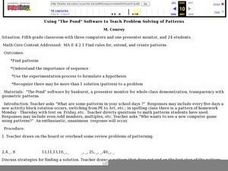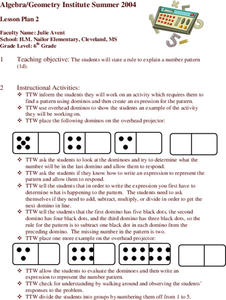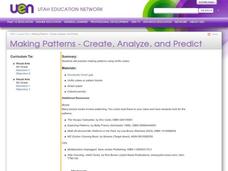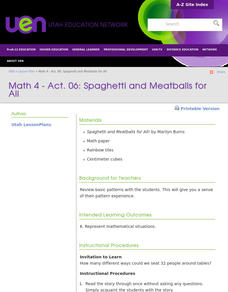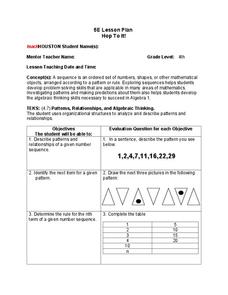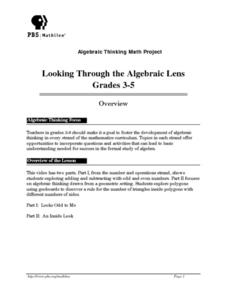Oregon Department of Education
Building and Expanding Patterns
The generation of a number, or shape pattern, is the focus of this math lesson. Pupils are presented with a variety of patterns shapes, and number patterns, then use worksheets embedded in the plan to gain further practice. The...
Curated OER
Representing Patterns & Evaluating Expressions
Write algebraic expressions, determine patterns, and evaluate expressions in a real-world context. Learners engage in a series of collaborative activities to identify, model, and give variables for real-world patterns. They write...
EngageNY
Integer Sequences—Should You Believe in Patterns?
Help your class discover possible patterns in a sequence of numbers and then write an equation with a lesson plan that covers sequence notation and function notation. Graphs are used to represent the number patterns.
Curated OER
Number Patterns in Everyday Life
Examine scenarios involving number patterns. Learners complete a series of activities, including working with Pascal's triangle ando completing chart activities based on different pricing for pizza toppings. An included extension has...
Curated OER
Problem Solving of Patterns
Fifth graders use a software program to practice their problem solving skills. As a class, they identify patterns in their days at school and review problem solving patterns in math. They solve different problems and discover that the...
Curated OER
Can You Tell What the Hidden Message Is?
In this math patterns worksheet, students use their problem solving skills to solve 6 problems that require them to complete messages by finding patterns.
PBS
Patterns to the Rescue!
Track down the Cyberchase episode that this instructional activity is associated with. Using a worksheet that is embedded in the plan, learners must find the next two numbers and shapes (a double pattern). Once these have been...
Curated OER
Number Patterns
An easy way to introduce numerical patterns, these activities can be made simpler by using addition, or more difficult with division, fractions, and percentages. Children examine patterns and determine the missing number in the sequence....
K20 LEARN
Didn’t We Already Learn That Pattern? Functions/Arithmetic Sequences
Just how many toothpicks does the pattern take? After watching a video of someone building a pattern with toothpicks, groups create methods to find the number of toothpicks needed to accomplish that task. Groups either use explicit...
Curated OER
Number Patterns
Sixth graders study number patterns. They observe dominoes to determine the next domino in the sequence. After studying the dominoes, they write an expression to represent the pattern.
Curated OER
Patterns Patterns Everywhere
Upper graders work with number patterns. In this pattern lesson plan, learners recognize and continue number patterns and find the rules. They do some as a class and complete an assessment.
Curated OER
Making Patterns - Create, Analyze, and Predict
Fourth graders practice making patterns using Unifix cubes and identify, analyze, and determine rules for describing numerical patterns involving operations and nonnumerical growing patterns. They also find an example of a pattern in...
EngageNY
Even and Odd Numbers
Even or not, here I come. Groups investigate the parity of products and sums of whole numbers in the 17th lesson in a series of 21. Using dots to represent numbers, they develop a pattern for the products of two even numbers; two odd...
Curated OER
How to Use the Rules of Divisibility and Estimation
Number patterns help your kids learn divisibility and estimation rules. This activity aims to strengthen their math fact memorization skills by presenting several rules they are expected to memorize through practice.
Curated OER
Patterns Everywhere!
Learners recognize and demonstrate the patterning of numbers and objects in our environment. They create a pattern using geometric shapes and find a missing number in a sequence.
Curated OER
Math 4 - Act. 06: Spaghetti and Meatballs for All
Fourth graders use manipulatives to practice math patterns.
Curated OER
Rule It Out
Here's a way to create math fact flash cards! Learners create their own cards and sort them into matching categories. Students start with addition and work their way up to harder math such as multiplication, and are asked to notice...
Curated OER
Number Patterns
Help your learners to identify even and odd numbers. In this number sense lesson, they read the book Madeline and use counters to identify which number has a "partner." Learners write down odd and even numbers on a whiteboard.
Curated OER
Algebraic Processes And Its Connections To Geometry
Youngsters explore number patterns within a Hundreds Chart. They discover six specific patterns from six teacher-directed rules in cooperative groups and describe in words ONE of the three patterns in their Learning Logs. They prove for...
Curated OER
Hop To It!
Students determine patterns. In this mathematics lesson, students act out a skit, play a sequence game, and complete patterns. Students use problems solving skills.
Curated OER
Patterns
Fourth graders investigate patterns and sequences. In this patterns and sequences lesson, 4th graders use a hundreds chart to build recurring patterns. Students skip count by threes and fives on a hundreds chart by coloring...
Curated OER
Divisibility Rules Using Scientific Calculators
Young learners apply divisibility rules to determine if a number is a factor of another number. They discuss what numbers are factors of another number and identify patterns using divisibility rules.
EngageNY
Dividing by (x – a) and (x + a)
Patterns in math emerge from seemingly random places. Learners explore the patterns for factoring the sum and differences of perfect roots. Analyzing these patterns helps young mathematicians develop the polynomial identities.
Curated OER
Looking Through the Algebraic Lens
Students work with rectangles to find generalizations for adding and subtracting odd and even numbers in part one of the lesson. In part two, students use geoboards to construct polygons, look for patterns, and find a general rule.




